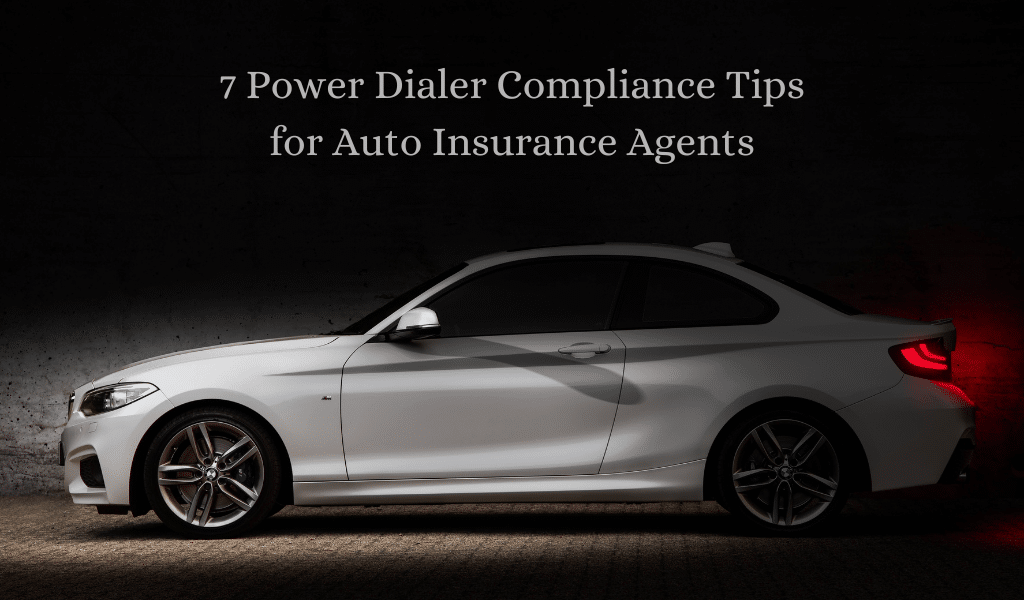Compliance isn’t a want – it’s a need. Here are seven ways to make sure your team is keeping up with power dialer compliance regulations.
You talk to people. In person, on the phone, through emails and texts, and maybe even snail mail, as an auto insurance agent, you talk to as many people as you can in any format you can. And, of course, a power dialer can help you talk to more people every day – as long as you follow phone sales and dialer compliance regulations.
Fortunately, most dialer compliance rules are easy to follow. You might even say that many of them are just basic courtesy. Don’t call people after 9:00 at night or before 8:00 in the morning. Don’t harass people by repeatedly calling them. Rules like these make sense. There’s not a lot of mystery as to why they exist, and they aren’t confusing.
There are also some regulations that are a little more involved. For example, there are a few pieces of information you’re required to provide at the beginning of a call, such as your name and the company you’re calling for.
Another critical factor in call and dialer compliance is that the penalties for non-compliance can be substantial. While the most severe penalties are often levied against companies with ongoing and egregious violations, you still don’t want to find yourself on the wrong side of regulations. Here are 7 ways you can make sure that doesn’t happen.
Remain compliant with telemarketing laws by using Call Logic’s call management software. Check out a free demo to learn more!
Power dialer compliance: 7 ways to stay on the right side of the rules
1. Get familiar. One of the best things you can do to ensure you’re in sales calls and dialer compliance with federal regulations is to familiarize yourself with those regulations. Now, I realize the idea of reading the Telephone Consumer Protection Act 47, SEC. 227. [47 U.S.C. 227] (TCPA) from the FCC, or The Code of Federal Regulations, Title 16, Chapter 1, Subchapter C, Section 310, also known as the Telemarketing Sales Rule from the FTC may not sound exciting. It’s true that these probably aren’t going to be as adventure-filled as Lord of the Rings. Even so, it’s a good idea to at least have some familiarity with what these texts include.
2. Be reasonable. Again, most of the regulations are just common sense. Don’t make sales calls to emergency numbers such as Poison Control or 911. Don’t make deceptive or abusive statements. Generally, that’s not a great way to sell auto insurance anyway.
3. Watch your clock. One of the keys to sales call and dialer compliance is watching the clock. Regulations state that you shouldn’t make calls before 8:00 in the morning or after 9:00 at night. That’s probably not difficult to follow if you’re making local calls. But if you’re selling auto insurance nationally, or even regionally across time zones, you’ll want to be aware that those times are based on the location of the call’s recipient. So an 8:00 p.m. call from Nevada to Nevada is fine. But that same call to someone on the east coast would be a violation.
4. Write it down. There are record-keeping requirements for companies involved in telephone sales. These records include the names and known addresses of the people who use your services, as well as the names and addresses of employees making calls. This shouldn’t be too challenging for auto insurance agents, as this information is all included in policies.
5. Documentation is important. That may seem like a redundant statement. Of course, documentation is important! In the case of sales and dialer compliance, though, this documentation is part of the TSR’s “safe harbor” provision. As long as you have written compliance procedures, train your team on those procedures, enforce compliance, access the national registry monthly (and maintain documentation of this), and your call violations are the result of an error, you may not be subject to penalties.
6. Power, not predictions. When we get into the actual technology, it’s helpful to understand that there are different types of dialing systems. A power dialer gives you options such as automatically dialing the next number on your list when you hang up a call, or using a click-to-call function. A predictive dialer is a type of power dialer system that makes multiple outgoing calls at once based on the average number of answered calls. So you may have five auto insurance agents, and a predictive dialer might call 10 numbers with the likelihood that only five people will answer. As you can probably guess, if more than five people answer, they’re left with no agent to talk to them. Read more about the different types of dialing software here.
7. Do Not Call compliance. Unless you have a pre-existing business relationship with someone, you can’t call them if their number is on the Do Not Call list. You can read more about the specifics of Do Not Call regulations here. The good news in this is that you don’t have to take care of this all on your own. Software like Call Logic will automatically scrub your list in the microseconds before a call goes through to ensure that you don’t accidentally call a number on the DNC list.
Don’t fear compliance. With the right software and a little attention, it’s not the challenge so many make it out to be.
Enhance your do not call compliance practices with Call Logic’s call management software, complete with do not call scrubbing. Sign up for a free demo today to learn more!

